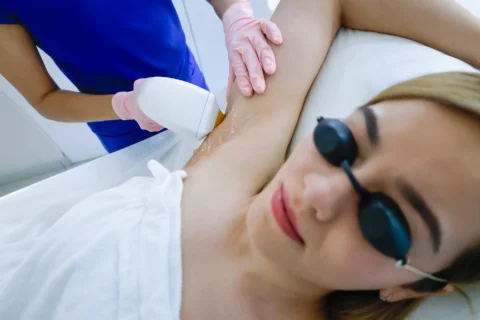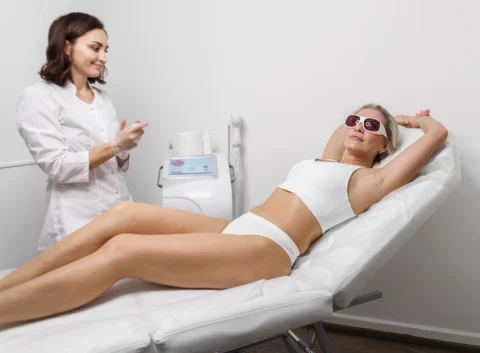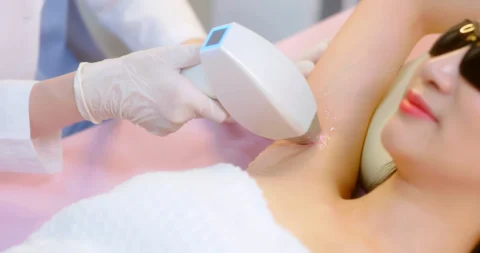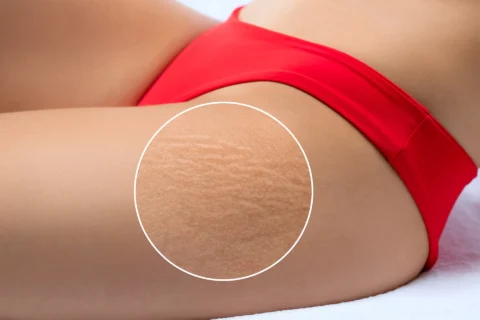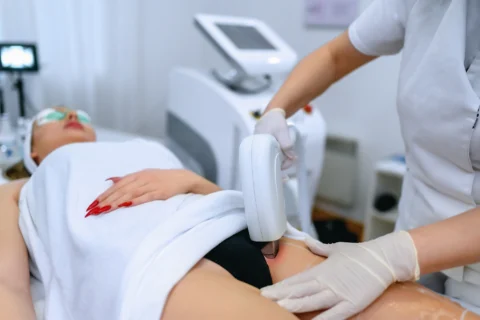
What You Need to Know About Laser Hair Removal
According to the National Laser Institute, an impressive 1.1 million laser hair removal procedures were performed in 2016. Laser represents a non-invasive procedure that has a high feel-good factor, helping individuals to feel their sexiest, smoothest selves.
Laser hair removal can effectively and safely remove unwanted hair from areas on the face such as the upper lip, chin, the back, armpits, arms, legs, bikini area–virtually anywhere, except the eyelids and area around the eyes.
The basics: how does laser hair removal work?
Highly concentrated beams of light emitted by the laser are absorbed by the pigment in the hair shaft, generating heat which damages the follicle and inhibits future hair growth while leaving the surrounding skin unharmed. Hair grows in three stages:
-
Anagen (the growing stage)
-
Catagen (the end of growth stage)
-
Telogen (the resting stage)
Because laser only affects actively growing hair follicles in the anagen phase, multiple treatments are usually needed.
There are four different kinds of laser: ruby, alexandrite, diode, and Nd:YAG. The laser professional administering your treatment will assess your skin tone, hair color, density and the coarseness of the hair you wish to treat, and determine the appropriate laser for you. In the past, individuals with lighter-toned skin and darker hair were the best candidates for laser, but nowadays, there is a safe and effective laser treatment for nearly everyone.
So how permanent is laser hair removal?
One very common misconception is that laser hair removal is permanent. It isn’t. What it can do, however, is reduce your unwanted body hair by up to 80%. One clinical study showed that 80% of patients who had undergone diode laser hair removal were satisfied, or very satisfied with their results.
Patients may require as few as two or as many as eight treatments to see optimal results. The location of the hair determines the interval between treatments–hair on the upper lip, for example, grows relatively quickly, so treatments may be repeated every four to eight weeks. Hair on the back is generally more slow growing, so treatment might be every three to four months. Factors such as the size of the area being treated, the density and the coarseness of the hair will also affect the number of treatments necessary.
The bottom line: laser offers permanent hair reduction. The only hair removal technique that guarantees permanent hair removal is electrolysis; but it has limitations in the quantity of hair it can remove. Laser hair removal costs $235 on average per treatment, so can require a significant financial outlay, particularly if you require numerous treatments. Having realistic expectations about what can feasibly be achieved is important.
What happens after laser hair removal?
Following laser, the hair does not fall out immediately. Usually, it takes a period of days or weeks before the hair begins to shed. Results can vary significantly between individuals. For some, the hair removal process may last several months, while for others it can last years. When the hair does re-grow, it’s usually finer and lighter, and therefore less noticeable. After the initial treatment, many patients choose to undergo regular maintenance treatments, once every six months or more.
Helpful tips if you’re thinking about laser hair removal:
-
Allow the hair you wish to remove to grow for at least six weeks before treatment. The laser only works when it can target the pigment in the growing hair shaft. No hair means ineffective treatment.
-
Find a board-certified physician, dermatologist or plastic surgeon who has undergone training in laser and possesses an excellent reputation and track record. Laser is safe, but mistakes can happen when inexperienced practitioners deliver laser.
-
Avoid sun exposure for six weeks before and after treatment. Sun exposure can hinder the efficacy of the laser treatment by darkening your skin tone, and cause unwanted side effects and complications.


